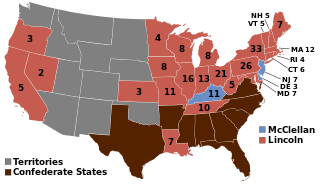
Presidential elections were held in the United States on November 8, 1864, near the end of the American Civil War. Incumbent President Abraham Lincoln of the National Union Party easily defeated the Democratic nominee, former General George B. McClellan, by a wide margin of 212–21 in the electoral college, with 55% of the popular vote. For the election, the Republican Party and some Democrats created the National Union Party, especially to attract War Democrats.

John Calvin Brown was a Confederate Army officer and an American politician and businessman. Although he originally opposed secession, Brown fought for the Confederacy during the American Civil War, eventually rising to the rank of major general. He later served as the 19th Governor of Tennessee from 1871 to 1875, and was president of the state's 1870 constitutional convention, which wrote the current Tennessee State Constitution.

Benton McMillin was an American politician and diplomat. He served as the 27th governor of Tennessee from 1899 to 1903 and represented Tennessee's 4th district in the United States House of Representatives from 1879 to 1899. He served as a diplomat during the administration of President Woodrow Wilson, initially as Minister to Peru (1913–1919) and afterward as Minister to Guatemala (1920–1921).

James Beriah Frazier was an American politician who served as the 28th governor of Tennessee from 1903 to 1905, and subsequently as a United States senator from Tennessee from 1905 to 1911. As governor, he reduced the state's debt and enacted mine safety regulations. He also attempted to control whitecapping.

Ben Walter Hooper, was an American politician who served two terms as the 31st governor of Tennessee from 1911 to 1915. Elected as a Fusionist candidate, he was one of just three Republicans to hold the office from the end of Reconstruction to the last quarter of the 20th century. His success was due to divisions in the state Democratic Party over prohibition; he received support from some of the party. During his two terms, Hooper signed several prohibition laws, enacted a measure requiring mandatory school attendance, and signed a law requiring direct pay for women workers.

The 2010 Tennessee gubernatorial election took place on November 2, 2010, to elect the next governor of Tennessee, alongside other state and local elections. Incumbent Democratic governor Phil Bredesen was term-limited, and is prohibited by the Constitution of Tennessee from seeking a third consecutive term. Knoxville mayor and Republican nominee, Bill Haslam was elected with 65.0% of the vote, defeating Democratic nominee Mike McWherter.

The 2010 United States House of Representatives elections in Tennessee was held on November 2, 2010, to elect the nine U.S. representatives from the state of Tennessee, one from each of the state's nine congressional districts.

The 1970 Tennessee gubernatorial election was held on November 3, 1970, to elect the next governor of Tennessee. Incumbent Democratic governor Buford Ellington was term-limited and was prohibited by the Constitution of Tennessee from seeking another term. Republican nominee Winfield Dunn, defeated Democratic opponent John Jay Hooker with 52.0% of the vote.

The 1958 Tennessee gubernatorial election was held on November 4, 1958, to elect the next governor of Tennessee. Incumbent Democratic governor Frank G. Clement was ineligible to run for re-election, as the Constitution of Tennessee prohibited governors from serving consecutive terms at the time. Democratic nominee Buford Ellington defeated former governor, Independent Jim Nance McCord, and Republican opponent Tom Wall with 57.5% of the vote.

The 1932 Tennessee gubernatorial election was held on November 8, 1932. Democratic nominee Hill McAlister defeated Republican nominee John McCall and Independent nominee Lewis S. Pope with 42.8% of the vote.

The 1928 Tennessee gubernatorial election was held on November 6, 1928. Incumbent Democratic governor Austin Peay died in office on October 2, 1927. Tennessee’s Democratic Speaker of the Senate, Henry Hollis Horton became governor according to Tennessee’s gubernatorial succession law. In the general election, Henry defeated Republican nominee Raleigh Hopkins with 61.1% of the vote.

The 1922 Tennessee gubernatorial election was held on November 7, 1922. Democratic nominee Austin Peay defeated incumbent Republican governor Alfred A. Taylor with 57.9% of the vote.

The 1920 Tennessee gubernatorial election was held on November 2, 1920. Republican nominee Alfred A. Taylor, brother of former governor Robert Love Taylor, defeated Incumbent Democratic governor Albert H. Roberts with 54.9% of the vote.

The 1912 Tennessee gubernatorial election was held on November 5, 1912. Incumbent Republican governor Ben W. Hooper defeated former Democratic governor Benton McMillin with 50.10% of the vote.

The 1910 Tennessee gubernatorial election was held on November 8, 1910. Incumbent Democratic governor Malcolm R. Patterson initially sought a third term but withdrew from the race after securing his party's nomination. Senator and former Democratic governor Robert Love Taylor was nominated after Patterson's withdrawal. On the Republican side, Ben W. Hooper defeated Alfred A. Taylor, Robert's brother, for the Republican nomination. In the general election, Ben W. Hooper defeated Robert Love Taylor with 51.89% of the vote.

The 1908 Tennessee gubernatorial election was held on November 3, 1908. Incumbent Democratic governor Malcolm R. Patterson defeated Republican nominee G. N. Tillman with 53.73% of the vote.

The 1898 Tennessee gubernatorial election was held on November 8, 1898. Incumbent Democratic governor Robert Love Taylor did not seek re-election. Democratic nominee Benton McMillin defeated Republican nominee James Alexander Fowler with 57.92% of the vote.

The 1892 Tennessee gubernatorial election was held on November 8, 1892. Democratic nominee Peter Turney defeated Republican nominee George W. Winstead, and Incumbent Governor John P. Buchanan, who ran as a Populist, with 47.86% of the vote.

The 1884 Tennessee gubernatorial election was held on November 4, 1884. Incumbent Democratic governor William B. Bate defeated Republican nominee Frank T. Reid with 51.24% of the vote.

The 1902 Tennessee gubernatorial election was held on November 4, 1902. Incumbent Democratic governor Benton McMillin did not seek re-election. Democratic nominee James B. Frazier defeated Republican nominee Henry Tyler Campbell with 61.77% of the vote.










